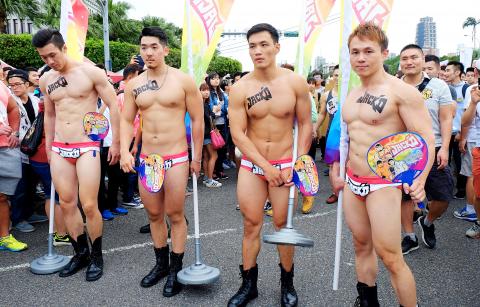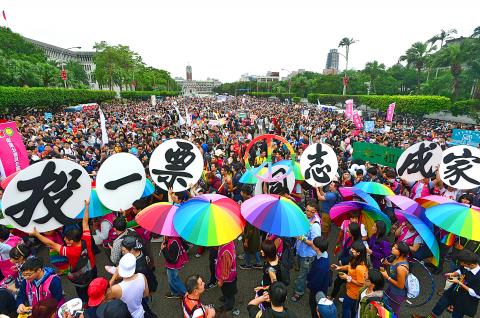The annual Taiwan Gay Pride Parade took place in Taipei yesterday afternoon, with the event centering on the theme of “no age limits,” with event organizers saying that members of the lesbian, gay, bisexual and transgender (LGBT) community and their supporters were invited to attend the event and explore ways in which society’s attitudes toward age and gender prevent people from freely expressing themselves.
People who contravene society’s “norms” are often seen as irresponsible and ostracized, the organizers said, adding that teenagers and older people often suffer the worst of this treatment, as society is more rigid in its expectations of these age groups.
Many participants at the parade, now in its 13th year, wore colorful costumes and waved rainbow flags or handmade signs calling for marriage equality.

Photo: AFP
Organizers said nearly 80,000 people attended the event.
However, the organizer’s call for “no age limits” sparked concerns over its interpretaion.
Lee Tsung-hua (李宗華) of the Warm Breeze Caring Association, a Taichung-based group advocating child welfare, said the association has always supported the LGBT community, but it could not disagree more with calls for young people to be liberated of age restrictions placed on their behavior.

Photo: Wang Yi-sung, Taipei Times
Yeh Chun-hsing (葉春幸), a legislative candidate of the Faith and Hope League, also opposed the group’s call for “no age limit,” saying that repeated calls to lower the legal age for sexual consent on the grounds of sexual autonomy would only lead to an increase in social problems such as abortions and sexual assault.
Earlier in the day, Democratic Progressive Party Chairwoman and presidential candidate Tsai Ing-wen (蔡英文) posted a video on Facebook, saying she supported marriage equality, and that all are equal before love.
Later, in response to media queries about the issue of regulations recognizing unions between same-sex couples, Tsai said it is an issue that society must confront, adding that as there are supporters and opponents, she hopes everyone can view the matter rationally.
Chinese Nationalist Party (KMT) spokesperson Lin Yi-hua (林奕華) said KMT presidential candidate Eric Chu (朱立倫) agreed with the broad direction of the LGBT activists’ stance on equal opportunities for marriage rights, but added that there should be more discussion over the issue due to the diverse range of opinions held in society.
A consensus must emerge among the public before matters can proceed toward legal amendments, Lin said.
People First Party Chairperson James Soong (宋楚瑜) said via party spokesperson Chen Yi-chieh (陳怡潔) that the PFP favors respect and acceptance on the issue of gay rights.
Additional reporting by Su Fang-ho and Chen Yen-ting

The Ministry of Foreign Affairs (MOFA) yesterday said it is closely monitoring developments in Venezuela, and would continue to cooperate with democratic allies and work together for regional and global security, stability, and prosperity. The remarks came after the US on Saturday launched a series of airstrikes in Venezuela and kidnapped Venezuelan President Nicolas Maduro, who was later flown to New York along with his wife. The pair face US charges related to drug trafficking and alleged cooperation with gangs designated as terrorist organizations. Maduro has denied the allegations. The ministry said that it is closely monitoring the political and economic situation

Conflict with Taiwan could leave China with “massive economic disruption, catastrophic military losses, significant social unrest, and devastating sanctions,” a US think tank said in a report released on Monday. The German Marshall Fund released a report titled If China Attacks Taiwan: The Consequences for China of “Minor Conflict” and “Major War” Scenarios. The report details the “massive” economic, military, social and international costs to China in the event of a minor conflict or major war with Taiwan, estimating that the Chinese People’s Liberation Army (PLA) could sustain losses of more than half of its active-duty ground forces, including 100,000 troops. Understanding Chinese

UNRELENTING: China attempted cyberattacks on Taiwan’s critical infrastructure 2.63 million times per day last year, up from 1.23 million in 2023, the NSB said China’s cyberarmy has long engaged in cyberattacks against Taiwan’s critical infrastructure, employing diverse and evolving tactics, the National Security Bureau (NSB) said yesterday, adding that cyberattacks on critical energy infrastructure last year increased 10-fold compared with the previous year. The NSB yesterday released a report titled Analysis on China’s Cyber Threats to Taiwan’s Critical Infrastructure in 2025, outlining the number of cyberattacks, major tactics and hacker groups. Taiwan’s national intelligence community identified a large number of cybersecurity incidents last year, the bureau said in a statement. China’s cyberarmy last year launched an average of 2.63 million intrusion attempts per day targeting Taiwan’s critical

‘SLICING METHOD’: In the event of a blockade, the China Coast Guard would intercept Taiwanese ships while its navy would seek to deter foreign intervention China’s military drills around Taiwan this week signaled potential strategies to cut the nation off from energy supplies and foreign military assistance, a US think tank report said. The Chinese People’s Liberation Army (PLA) conducted what it called “Justice Mission 2025” exercises from Monday to Tuesday in five maritime zones and airspace around Taiwan, calling them a warning to “Taiwanese independence” forces. In a report released on Wednesday, the Institute for the Study of War said the exercises effectively simulated blocking shipping routes to major port cities, including Kaohsiung, Keelung and Hualien. Taiwan would be highly vulnerable under such a blockade, because it